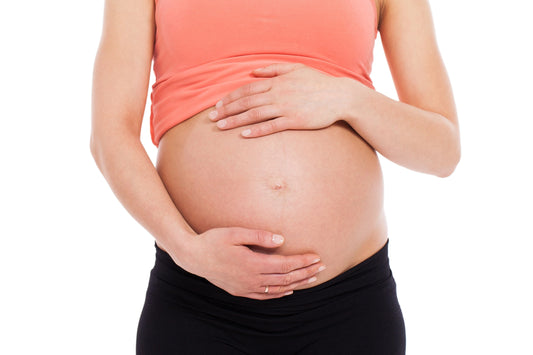Each and every pregnancy can bring about a wide range of symptoms, which can vary significantly over the course of the nine months, or from pregnancy to pregnancy, and even during different pregnancies with the same mum!
One of these symptoms is headaches. Pregnancy related headaches can be caused by a variety of factors and more commonly appear during the first few weeks and less so during the second and third trimesters. Let's take a look at what triggers head pain while pregnant and what could be cause for concern!
Causes of Headaches in Pregnancy
The causes of head pain during pregnancy can vary, mainly based on the gestational period (first, second or third trimester).
Hormones
During the first few weeks of pregnancy, hormone levels, such as oestrogen and progesterone, rise significantly which can trigger headaches.
Increased blood volume
Another cause of headaches during early pregnancy is linked to the increase in blood volume occurring in the pregnant woman's body, which affects blood vessels in the brain.
Physical Changes
Weight gain, altered posture and muscle tension, which occur towards the end of pregnancy, can contribute to a headache during pregnancy third trimester.
Stress and Fatigue
Pregnancy can be a time of emotional and physical stress, which can lead to tension, headaches, and a migraine while pregnant.
Nutrition
Certain foods or drinks can trigger headaches in some pregnant women, for example caffeine or aspartame (a sweetener).
Throughout pregnancy, it’s even more important than ever to follow a healthy, balanced diet; to stay well hydrated; and to limit certain foods which may cause problems to mum or her unborn baby, such as caffeine.
Pregnancy headaches: remedies
What can you do to make a headache related to pregnancy disappear? From medication to natural remedies to advice on improving your overall health, we’ll explain all you need to know.
Make rest a priority
If stress and fatigue are one of the causes of your pregnancy headaches, it goes without saying that you must prioritise self-care. Making time for rest and taking things a little slower are even more important at this precious time!
Yoga or meditation
Practising yoga during pregnancy, meditating or simply taking some ‘me’ time, all help to offer pregnancy headache relief, as well as reducing stress and preparing your mind and body for the great change ahead.
Physical Exercise
Regular physical activity, such as walking or swimming, can improve circulation and help reduce muscle tension. It also has beneficial effects on mood, alleviating tension, and stress.
Drink plenty of water and avoid excess sugar
Drinking plenty of water can help prevent dehydration, one of the most common causes of headaches. Avoiding foods high in sugar or fat is also beneficial.
Approved medication
Paracetamol is the safest medication to take during pregnancy and can also prove a great help to relieve migraine while pregnant. As always, you should consult your doctor before taking any medication.
Natural remedies for headaches during pregnancy
Do old-fashioned remedies offer a cure for pregnancy headache? They certainly won't hurt! Try applying a cold or warm compress, massaging the area, or using essential oils such as lavender.
Headache and pregnancy, when to worry
Although headaches are fairly common during pregnancy, it’s always a good idea to consult your doctor, as they can be a symptom of something more serious and warrant further investigation.
Consult your doctor immediately if you are experiencing any of the following:
- Sudden severe headache in pregnancy
- Blurry vision and headache in pregnancy, swelling or abdominal pain
- Headache with a high fever
- Headache with high blood pressure
- Headache which doesn’t improve after taking paracetamol or trying natural remedies
- Recurrent headaches
First trimester headaches
Headaches during early pregnancy are a fairly common symptom, similar to morning sickness. What causes them?
- Hormonal fluctuations: a sudden increase in hormones such as oestrogen
- Vascular changes: changes in blood circulation and increased blood production in the body
- Tiredness and fatigue: the typical first trimester feeling of exhaustion, especially when combined with nausea and morning sickness
Second and third trimester headaches
Headaches towards the end of pregnancy have quite different causes:
- Postural changes: an increase in the size and weight of the womb causes changes in a woman’s posture that can affect muscle tension and can trigger headaches.
- Stress and anxiety: as the birth approaches, a pregnant woman can experience increased levels of stress and anxiety, which can manifest in the form of headaches.
The symptoms described are for information purposes only and in no way replace the formulation of a diagnosis or treatment plan by a doctor. We recommend that you always seek the advice of your GP, doctor and/or healthcare specialist.









